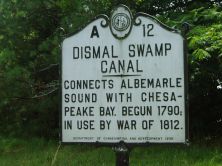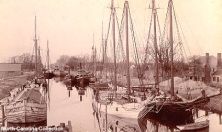
DISMAL SWAMP CANAL marker reads: Connects Albemarle Sound with Chesapeake Bay. Begun 1790; in use by War of 1812.
Authorized in 1790, the Dismal Swamp Canal connects Albemarle Sound in North Carolina with Chesapeake Bay in Virginia. In 1728, Col. William Byrd II of Virginia was among the first to realize how important a canal could be to Virginia and North Carolina. Byrd led a band of surveyors that same year to mark the border between North Carolina and Virginia.
In 1763, George Washington and Fielding Lewis surveyed the canal route. The original plan was for it to connect the Albemarle Sound to the Chesapeake Bay via Lake Drummond. The canal was built three miles east of Lake Drummond, but there is a smaller canal to connect the two.
In 1790, the North Carolina General Assembly authorized the building of the canal. A private company which used slave labor was hired to do the job. Construction commenced in 1793. A system of locks, built so ships could be raised or lowered in the waterway, were set up, in North Carolina, at South Mills, Spence’s lock, the Culpeper lock, and, in Virginia, at the Northwest or Wallace lock, the Wilkins lock, and the Deep Creek or Gilmerton lock. The only locks which remain today are in South Mills and Deep Creek; the others were removed between 1896 and 1899.
By about 1805, the canal was complete, but only small boats could traverse its course. The canal was in use during the War of 1812. Between 1839 and the beginning of the Civil War, it was widened and deepened. The locks were improved with masonry, enabling larger boats such as passenger boats, freighters, and stern-wheel steamboats, to pass through. Between 1896 and 1899, the masonry locks were replaced with timber ones. During the Civil War, the canal fell into disrepair but it reopened in 1899.
Originally owned by the Dismal Swamp Canal Company, the canal was sold to the Lake Drummond Canal and Water Company. On March 30, 1929, the federal government acquired the canal for $500,000. The U.S. Army Corps of Engineers now supervises it. Today, the Dismal Swamp Canal is nineteen miles long, sixty feet wide, and at a controlling depth of nine feet. The canal is part of the Intracoastal Waterway that stretches along the Atlantic and Gulf Coast states.
In 1763, George Washington and Fielding Lewis surveyed the canal route. The original plan was for it to connect the Albemarle Sound to the Chesapeake Bay via Lake Drummond. The canal was built three miles east of Lake Drummond, but there is a smaller canal to connect the two.
In 1790, the North Carolina General Assembly authorized the building of the canal. A private company which used slave labor was hired to do the job. Construction commenced in 1793. A system of locks, built so ships could be raised or lowered in the waterway, were set up, in North Carolina, at South Mills, Spence’s lock, the Culpeper lock, and, in Virginia, at the Northwest or Wallace lock, the Wilkins lock, and the Deep Creek or Gilmerton lock. The only locks which remain today are in South Mills and Deep Creek; the others were removed between 1896 and 1899.
By about 1805, the canal was complete, but only small boats could traverse its course. The canal was in use during the War of 1812. Between 1839 and the beginning of the Civil War, it was widened and deepened. The locks were improved with masonry, enabling larger boats such as passenger boats, freighters, and stern-wheel steamboats, to pass through. Between 1896 and 1899, the masonry locks were replaced with timber ones. During the Civil War, the canal fell into disrepair but it reopened in 1899.
Originally owned by the Dismal Swamp Canal Company, the canal was sold to the Lake Drummond Canal and Water Company. On March 30, 1929, the federal government acquired the canal for $500,000. The U.S. Army Corps of Engineers now supervises it. Today, the Dismal Swamp Canal is nineteen miles long, sixty feet wide, and at a controlling depth of nine feet. The canal is part of the Intracoastal Waterway that stretches along the Atlantic and Gulf Coast states.

References: Alexander Brown Crosby,The Dismal Swamp Canal (1946) Mary Evelyn Whitehurst, “The Dismal Swamp Canal,” in Historical Highlights of Camden County, 1777-1977 (1977) The Way We Lived in North Carolina, website map: http://www.waywelivednc.com/maps/historical/dismal-swamp-canal.htm Camden County, North Carolina website page on Dismal Swamp Canal: http://www.albemarle-nc.com/camden/history/canal.shtml US Army Corps of Engineers, “Norfolk District Dismal Swamp & Dismal Swamp Canal Environmental Restoration and Flood Control Study”: http://www.nao.usace.army.mil/projects/civil%20works%20projects/Dismal%20Swamp/homepage.asp